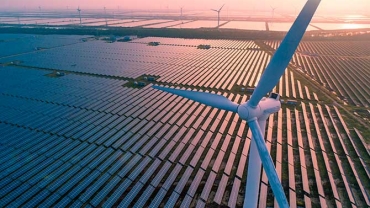
Heat transition
We work with you to find solutions
How can businesses and knowledge institutions contribute to solutions for the heat transition? Which government policies are most suitable for national, regional and local plans? And how can all parties together take concrete steps towards achieving the heat transition? We are pleased to explore these questions with you.
Sustainable heat sources for the built environment
Since the 1960s, heat and cooling for buildings in the Netherlands have largely been generated using gas. The transition from fossil fuels to sustainable heat sources for residential and commercial buildings is a key task within the broader energy transition. For industry, decarbonising heat demand largely coincides with the challenge of industrial decarbonisation.

Sustainable heat solutions
There are many sustainable solutions available for the heat transition in the built environment: from electric heat pumps, biogas and thermal energy storage to industrial residual heat, geothermal energy and aquathermal energy. Cost-effectiveness and reliability of heat supply are essential requirements. Which solution is best suited for which situation? Making those choices requires a coordinated, collaborative approach between government and industry.
Climate agreement goals for heat transition demand action
The transition to sustainable heating sources goes hand in hand with making buildings more energy-efficient. The Dutchgovernment’s climate agreement states that seven million residences and half a million buildings must be disconnected from natural gas by 2050. In the meantime, the sustainability of 1.5 million existing residences must have been improved via insulation and the use of sustainable heating and electricity by 2030. This huge task demands considerable effort from all parties involved.
Would you like to stay informed?
Subscribe to this topic
Housing and utility construction
Building companies involved in both housing and utility construction must realise innovations to increase the demand for heating and reduce energy meters to zero. Meanwhile, governments set the standards by increasing energy performance levels, among other things, while housing associations as well as building tenants and owners formulate additional requirements to make their property portfolio greener. Technology companies and grid operators can also contribute to the energy efficiency of buildings by optimising heat consumption via data analyses and digital tooling.
Sustainable heat supply and financing
Energy companies are working on more sustainable methods for generating heat, while industrial groups and waste processors are partnering with grid operators on providing residual heating to networks. The financing of initiatives for the heat transition often demands long-term and large-scale investments, in which financial institutions and government bodies could work together.
Government bodies facilitate the market
The efforts of the European Union and national and local governments is decisive for all possible solutions. They determine prices and stimulation, coordinate partnerships and formulate policy. What is the future vision and how can it be translated into an approach on a national, regional, municipal and neighbourhood level? Government bodies facilitate market parties to realise sustainable solutions in the long term.
Important questions related to the heat transition
Which sustainable heat solution is most suitable for specific users and regions?
How do parties organise policy, (un)subsidised investments, and the balance between risk and profit for energy-efficient and sustainable initiatives?
Which infrastructure does sustainable heating of the built environment require?
What governance structure is most in line with a public-private partnership for the heat transition?

More information?
We can provide support on these and other issues. Our Assurance, Advisory, Tax & HRS experts can facilitate market parties, government bodies and investors in all aspects of the heat transition based on their experience in all the aforementioned sectors and cross-sectoral partnerships. For more information contact us and discover how we can help you realise your heat transition goals.
Contact us

Partner, Energy transition and sustainable energy, PwC Netherlands
Tel: +31 (0)65 160 08 61

















